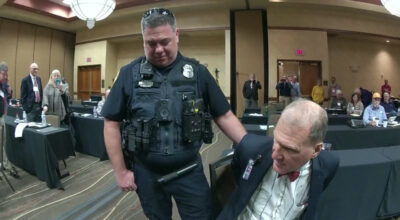

CHATTANOOGA, Tenn., Feb. 22, 2023 – It may come as a shock that people in Tennessee are subject to a violent police abuse called warrantless arrest. An officer conducts a warrantless arrest under a red abuse flag when he seizes and cuffs a person without warrant when by law he is required to get one beforehand.
By David Tulis / NoogaRadio Network
The law is § 40-7-103 that gives exceptions to the constitutional protection against warrantless arrest and a police state abuse called “general warrants.”
In a warrantless arrest an officer sees — on presumably a reasonable suspicion — that you have committed a crime and he is going to arrest, cuff and cage you on the spot.
Absent from this picture in a misdemeanor: A neutral judge’s determination that a misdemeanor has been committed, and the person before the officer has committed it.
The arrest descends upon you like a vulture. Based on his perception and training, you are guilty and should be taken to the jail on a criminal charge.
The lawless policing activity violates T.C.A. § 40-7-103, rejecting the “public offense” standard for the alleged crime.
Driving on revoked, suspended or canceled, as are these five people, are not arrestable offenses because they are not “public offenses.” If indeed these are crimes (a separate issue), then require arrest under a warrant. The offense does not have a public, intimidating, threatening and visible demeanor.
They are not in the nature of an affray, riot or breach of the peace.
What’s in a warrant? Magistrates knows ‘elements’
The reason this happens is that no one has looked closely at the warrant requirement in Tennessee law. It is required that for an arrest to have warrant, and be under a signed warrant, the accuser must go to the judge or magistrate before laying a hand on the citizen.
Here are the steps.
The officer and accuser must give a report and be interrogated by the magistrate about what happened. The magistrate reduces the alleged crime to writing, interrogating the officer about the essential elements. So, if the crime has five essential elements, the magistrate questions the officer about each of the elements so that they might be part of the charging instrument or complaint.
To make sure the elements are there – that is part of the judicial process. Officers appear not to know the essential elements of crimes and are liable to not see all the elements. That’s what magistrates are there for. The judicial commissioner or magistrate has law knowledge. With that knowledge, he elicits from the officer those facts that constitute a crime.
Upon information made to any magistrate of the commission of a public offense, the magistrate shall examine, on oath, the affiant or affiants, reduce the examination to writing, and cause the examination to be signed by the person making it.
With all the essential elements and all pertinent facts, you have a warrant.
Once the officer signs the affidavit under oath, the judge signs the document and it becomes the warrant. The officer then goes to find the accused to make the arrest under the warrant. The law is at T.C.A. § 40-6-201 et seq.
The written examination shall set forth the facts stated by the affiant or affiants that establish that there is probable cause to believe an offense has been committed and that the defendant committed it.
Clunky steps are protective
Don’t these clunky, complicated, complex measures delay the entire process of securing an arrest? Isn’t that a problem? Doesn’t current practice work better, delivering the accused more quickly to justice?
Notice the care involved in obtaining a warrant?
(a) If the magistrate is satisfied from the written examination that there is probable cause to believe the offense complained of has been committed and that there is probable cause to believe the defendant has committed it, then the magistrate shall issue an arrest warrant. The finding of probable cause shall be based on evidence, which may be hearsay in whole or in part; provided, however, that there is a substantial basis for believing the source of the hearsay to be credible and for believing that there is a factual basis for the information furnished. (emphasis added)
The steps are designed to make sure that the officers not making a mistake and that, if there is an arrest, that it is truly is of a person who deserves to be brought to bar.
The legal process connects a crime with the alleged perpetrator.
I ask Matt Lee of the sheriff’s department to tell me whether these people were arrested under a warrant. Of these five in a recent posting at Chattanoogan.com, at least some are sure to be under the warrantless arrest scheme. All are arrested for pretended “traffic” crimes — not allowed under law, as per Tennessee Transportation Administrative Notice.
➤ The woman Emily Kristin Newt is “arrested on a citation.”
➤ James Chuck Thomas is “arrested on a warrant.”
➤ Eric Charlie Holland is “arrested on a citation.”
➤ James Dewayne Jones is “arrested on a warrant”
➤ Norman Harold McKelden is “arrested on a citation.”
Mr. Lea has not responded to my inquiry as to the meaning of “arrested on a citation.” People who sign citations are not arrested. They go prior to their hearings in sessions court to Silverdale for booking. But that is not being “arrested.”
The federal and state bill of rights disallow what is a longstanding abuse by the courts accepted by everybody involved here in Hamilton County.
County under notice since 2020
Hamilton County has been under warrantless arrest administrative notice from me since April 15, 2020, with no change in policy. Chattanooga has been under the same administrative notice with no apparent changes.
Law enforcement agencies are not about the law. They’re not about protecting people’s property, nor their rights, nor their integrity of their persons, effects and movements. They are about their own glory and their own pseudo pretended authority against us. Rather than being protectors, they are the biggest danger to the common citizen.
A police officer on an average day commits more crimes than your worst gangbanger.
I have petitioned magistrate Barbara Holmes in U.S. district court in Nashville for an injunction against Franklin, Tenn., and every other city in the state to end this evil custom as part of my suit for false imprisonment and false arrest covering the Tennessee judicial conference for NoogaRadio Network.
http://s6.voscast.com:7162/stream David show live 7A, repeating 6P weekdays


You describe crimes, assault upon People of Tennessee by sheriff’s deputies. False arrest and false imprisonment are serious crimes that are committed on a daily basis by thugs hired to pursue revenue for a corporation. Are these corporations chartered for crime against the People of Tennessee?
I would doubt it, since the first sentence of the Tennessee Constitution clearly states that all power is inherent to the People.
Only one of the People can empower a magistrate to write a Lawful warrant. Police and sheriff’s deputies have no power to arrest anyone.
When the People start prosecuting these crimes, under their rightful power, these crimes will stop. In the meantime the Municipal corporations have been allowed these crimes for decades, and I’m sure it pays quite well.
Guilt of Party Arrested
An unlawful arrest cannot be justified because the arrested party was actually guilty of the charge for which he was arrested. The person charged with an offense can only be deprived of his liberty by due process of law, and this constitutional safeguard applies to the guilty as well as the innocent.
Thus the guilt of the one arrested has no bearing on the legality of an arrest:
As stated in Annotation 25 A.L.R. 1519: “No one can recover damages for a legal arrest and conviction; therefore, in cases of malicious prosecution, it becomes necessary to await the final determination of the action. But the same principle does not apply to an action for false imprisonment, as the form of action is based upon an illegal arrest; and no matter ex post facto can legalize an act which was illegal at the time it was done.”
The charge of “driving” on a revoked (non-existent License/contract) is itself a ludicrous masquerade, that is never in evidence. Therefore, evidencing a false arrest/imprisonment, violation of the right to life that people own, by he grace of God.
As there is no evidence testified to, as to a man/woman “driving” or “operating” a “motor vehicle”. Police have no lawful authority for making judicial determinations with regard to people.
A municipal corporation has no Lawful power to abrogate the People’s right to life.